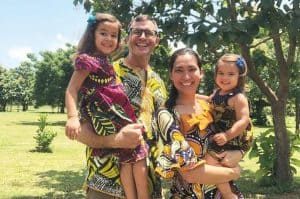


Written by Dr. Jennifer Smith, a Post-Resident serving at Hospital of Hope in Togo through World Medical Mission.
“We have a new patient. A girl with a snakebite,” announced the night duty nurse.
By this point, snakebites felt almost like cruise control. We had gone through a period where we would see, on average, two snakebite patients per shift. You order a clot time, give antivenom if the clot time is abnormal, then repeat six hours later until the clot time is normal and stable.
Occasionally, the patient or family would add a little extra flair to the visit by actually bringing in the dead snake. On a few occasions, they dumped the dead snake on the floor at my feet. My response was a small yelp, a jump backwards, and then running behind the counter to put a barrier between myself and the snake, while asking the patient’s family to please get rid of the snake. They laugh.
But this girl was different. She was asleep outside (it was hot season, and often cooler at night outdoors than indoors) and was bitten on her face. Her upper lip had swollen to about four times the size of normal and had a slow trickle of blood dripping from the bite site. Without waiting for the clot time result, she received four vials of antivenom. I consulted with a friend who advised me to also give the youth dexamethasone and Vitamin K. Nevertheless, the swelling continued.
Within three hours, her entire face had blown up to unrecognizable, and the swelling was threatening her airway. At this point she was so swollen that she could not open her eyes or close her mouth. Blood-stained drool poured from the corners of her lips. Thankfully she never needed it, but I asked the surgeons to bring an emergency airway kit to leave at her bedside in case things continued to worsen.
While most snakebite patients are usually in a general medical bed for one to two days, she stayed multiple days in our ICU and then several more in a general medical ward. But she did improve and got to go home once the swelling began to go down.
The night of her admission, I learned what it means to “pray without ceasing.” Even throughout the other tasks I had, and other patients to see and care for, in the background of my mind ran a continuous prayer for this girl—that the swelling would not cut off her airway, for her healing, and that the Lord would give me wisdom in how to care for her.
There have been several more scenarios since I started working here that have allowed me to practice this fervent prayer without ceasing. And although I would rather not be in such stressful situations, I am thankful for the frequent reminder of my dependence on the Lord and for His good promise to be always with me. I am thankful that even when things seem out of my control, I can trust that the Lord is ultimately in control.
“I can trust that the Lord is ultimately in control.”
We also give thanks that we witnessed our first baptisms since our arrival in January 2021. We celebrated with a Togolese brother who made his faith public, along with two children from a missionary family on our team, and an adult child who came to visit her parents. We celebrated their baptisms at the “Hippo Pond” with the local family of hippos gathered about 50 yards away from us.
Each testimony we heard was beautiful in its own right; demonstrating how God’s truth, love, and grace reaches those near and far from us, from our very children, to those entrenched in a traditional religion and animistic culture far from our own experience.
“Rejoice always, pray without ceasing, in everything give thanks; for this is the will of God in Christ Jesus for you” (1 Thessalonians 5:16-18).
A medical ministry of Samaritan's Purse, World Medical Mission places volunteer medical personnel in short-term service in mission hospitals and clinics in the developing world, providing critically-needed resources as a witness of God's love. Your gift will help us fulfill this mission.